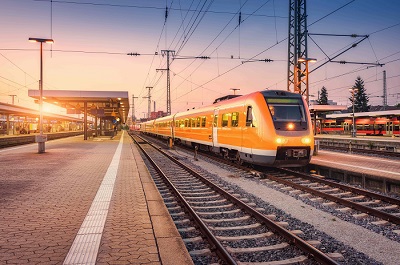by MTHULISI SIBANDA
JOHANNESBURG – HUAWEI aims to accelerate digital transformation in the rail sector through its Future Railway Mobile Communication System (FRMCS) solution, 5G Digital Indoor System and Rail Cloud offerings.

High speed train
At the recent Southern African Railways Association (SARA) conference and exhibition, Huawei revealed how its connectivity solutions are enabling the digital transformation of the railway industry, and how the above solutions, in particular, could make for a vastly improved, safer and more efficient railway experience.
“During SARA 2023, we talked to railway operators and the consensus is that we are all looking for solutions that make railways smarter, safer, more visualised, more efficient, and more reliable,” said Victor Guo, President of Huawei Sub-Saharan Africa Enterprise Business.
He added that communication technologies will be crucial for their ability to do so.
The first step in achieving this kind of seamless connectivity is to accelerate the shift away from traditional ultrahigh frequency (UHF) and 2G Global System for Mobile Communications-Railway (GSM-R) telecoms networks that have sustained railway communications for the past two decades.
These technologies are steadily becoming obsolete and unable to handle the demands for bandwidth and data required by a 21st-century railway.
Launched in mid-2019, LTE-based FRMCS is a digital wireless communication system optimised for railways and has been widely deployed in China.
The technology supports a 5G-oriented evolution and interconnectivity with GSM-R, which is likely to remain on many networks up to 2025 and beyond. Its advanced features include multiple trunking services such as Mission Critical Push-to-Talk (MCPTT) voice, and data.
Together, LTE FRMCS, 5G DIS and Rail Cloud offer a comprehensive solution for a reliable connectivity environment demanded by modern railways, according to Huawei.
These types of technologies are also gaining wide recognition of their importance to the future of the sector.
“High-quality public transport needs a double priority: both physical and digital infrastructure,” said Guo.
Agostinho Francisco Langa Júnior, SARA President, said the organisation’s mission is to promote regional trade by ensuring a seamless, predictable, and cost-effective railway system across the region.
“It is therefore crucial that our railway operators standardise and align in terms of specification to achieve the required interoperability. Safe railway operations hinge upon the robustness of train control technology.” he said.
At the event, Huawei and SARA signed a Memorandum of Understanding (MOU) with the purpose of creating a non-exclusive framework of cooperation for the transformation of Southern Africa’s railway transport and corridor logistics.
This is to enable seamless, efficient, smooth, cost-effective and quality railway corridor services on all SARA corridors.
– CAJ News
